Random Reviews: Alien Legion: Footsloggers
This Epic Comics series handles genuine development and frustrations through a surprisingly grounded sci-fi lens
—by Nathan on October 27, 2025—
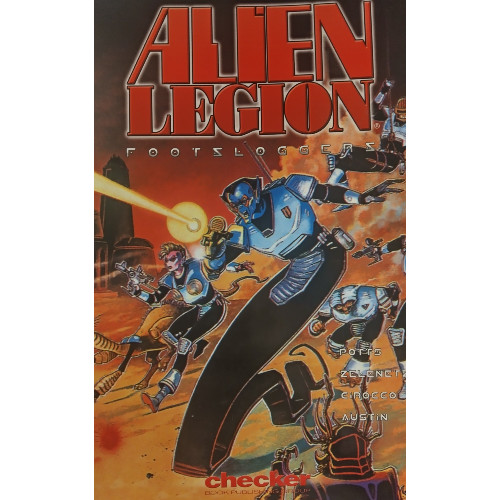
On the back cover of the volume I am reviewing today, part of a description says that Alien Legion was initially conceived by Carl Potts in the 1970s as the "French Foreign Legion in space." Having no idea what the "French Foreign Legion" was, I did a little sleuthing, coming to find that the Legion is comprised of foreign individuals of any nationality. There are other small details I learned–such as that individuals serve under an assumed name, which is enforced for a year and then made optional, or that you are obligated to serve five years–but I wasn't quite so curious about the history or the minutiae. But that "foreign individuals of any nationality" stuck with me as I read this volume.
Potts, serving as editor on the initial series and teamed with writer Alan Zelenetz and penciler Frank Cirocco, developed Alien Legion for Marvel's Epic Comics imprint after initially proposing a series set in the mainstream Marvel Universe. Like another Epic space saga, Jim Starlin's Metamorphosis Odyssey, Alien Legion would be a more mature take on heroic themes and characters, specifically centered on the lives of these military men and the system under which they serve. Originally intending for the series to focus on a complete human militia, Potts elected to embrace an intergalactic vision of the Foreign Legion concept, drawing in an eclectic group of extraterrestrial Legionnaires who must work together–if they can–to fight for the good of a coalition of planets…even if it means following the most outlandish, even idiotic orders.
Alien Legion: Footsloggers
Writer: Alan Zelenetz
Pencilers: Frank Cirocco, Terry Shoemaker, Chris Warner
Inkers: Terry Austin, Carl Potts, Chris Warner, and Whilce Portacio
Colorists: Bob Sharen and Mark Badger
Letterers: Jim Novak, Michael Higgins, Janice Chaing, Andy Kubert, and Phil Felix
Issues: Alien Legion #1-6
Volume Publication Date: June 2005
Issue Publication Dates: April 1984, June 1984, August 1984, October 1984, December 1984, February 1985
Publisher: Epic Comics (Marvel Comics imprint, original issues); Checker Book Publishing Group (collected edition)
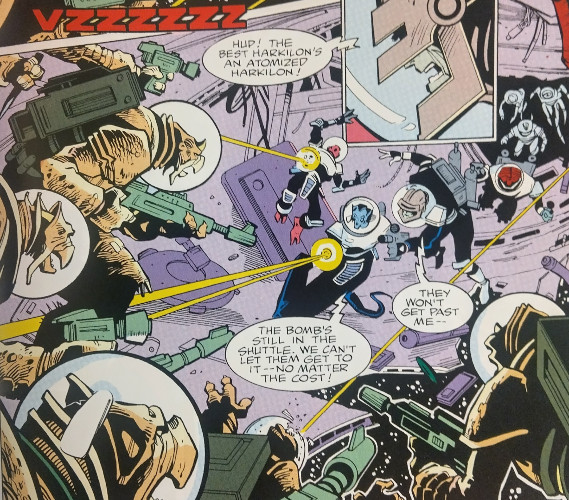
Though Potts does not write these issues, all credit should be given to him for his creative and editorial role. I had originally assumed Potts contributed to the script, which was initially why I wanted to review this volume shortly after checking out Potts' work on Punisher: War Journal. But at least Potts was the brains behind the idea, and it absolutely has merit to it, at least across these six issues.
I know next to nothing about the military, so I cannot say whether, under Potts' guidance, Zelenetz and Cirocco take actual situations and transpose them to their outer space saga. What I can say is that, together, the writer and artist find the human instincts, frustrations, hopes, and disappointments each of their Legionnaires struggle to face, even if those Legionnaires are not human themselves, and draw them out carefully across these first six issues.
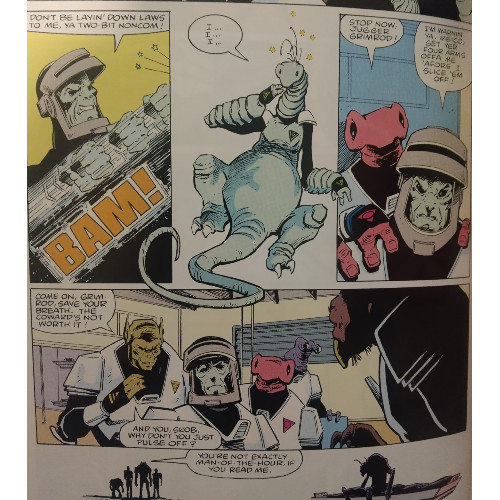
There's a scene partway through the first issue where representatives of a planetary coalition called the Tophan Galactic Union argue with three military agents over the state of a planet our starring Legionnaires in Nomad Squadron endeavor to wrestle from a band of space pirates. The two sides quibble over the mission, the military agents claiming they've had other priorities previously which prevented them from acting to liberate the planet earlier, forcing the sending of the Legion, and the representatives asserting they could have prioritized better to prevent the current bloodshed. "Merely Legionnaires," one representative adds snidely, "but Union soldiers nonetheless." Bravo to this guy for making that clarification, I guess.
Such a scene embodies the frustrations the Legionnaires deal with: they're considered soldiers, but they don't retain the respect of the military–indeed, Nomad Squadron leader Sarigar finds himself often at odds with more "official" military leaders. The Squadron does the dirty jobs, and they do them well, but they're ultimately viewed as cannon fodder. They have to comply with strange and seemingly arbitrary requests, such as not using laser weapons against those pirates at the mine to preserve the ecological stability of the planet. The series isn't meant, it seems, to be a satire of military or paramilitary life, but there are enough elements to at least give the impression of the genre. Zelenetz and Cirocco are genuine in these frustrations they draw out of our characters, but when dealing with the series' outlandishly sci-fi nature, they paint real emotions against a far out backdrop. It dampens the series' bite, takes real feelings and struggles and gives them a fake face, making the bitterness more palatable.
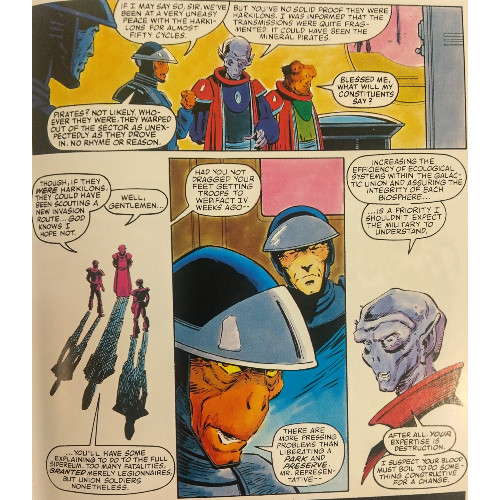
None of this hinders Alien Legion's ability to skillfully navigate issues of authority or interpersonal struggles. An issue where Nomad Squadron inserts itself in an investigation against the wishes of their superiors ratchets up the tension between the Legionnaires and the local police force, painting our heroes as do-or-die rogues with the spines needed to take the risks necessary to prevent evil, even when the so-called "right" answer would better align with policy. When ridding the mines of their deadly pirate foes, Nomad Squadron resorts to using actual weaponry, not only to save themselves but a local species, Sarigar taking responsibility for his team's brash yet necessary action. These soldiers fight enemies who are not dictated by policy or certain rules yet find they are hindered by rules themselves; Zelenetz juggles the question of whether right conduct in times of war is decided by behaving how leadership decides or by carving a path forward based on an unspoken, broader sense of morality and justice.
Delightfully roguish our heroes may be in flaunting authority, but they aren't perfect, and Zelenetz and Cirocco do well to enhance Nomad Squadron with a series of flaws. Durge, a larger, lumbering alien nicknamed "the Tank," take drugs to enhance his speed and offset the encumbrance of his prodigious form; lieutenant Montroc wrestles with a searing hatred towards his father, the man who forced him to enlist to gain some backbone, his rage contested by his unflappable support for his squad; and other members give into their own vices, such as gambling, taking pleasure in killing, and desertion. As I noted, most of Nomad Squad is made up of aliens, though they're incredibly human in how they behave and feel, providing a unity amongst the group which is periodically challenged or threatened, like in any group, by conflict or differing opinions. Picture "Suicide Squad but aliens," and you've got a decent image of the crew's makeup.
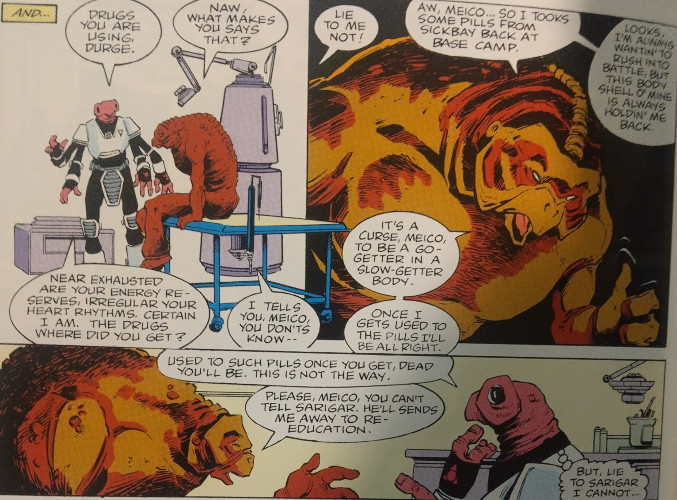
Engaging as the main narratives are, Zelenetz seems to have particular fun with a series of smaller stories tacked on to the end of most issues. These back-up strips are primarily used for additional insight into our characters, providing much-needed backstories to flesh out personalities and motivations. Yet some of these strips allow glimpses into other plot points Zelenetz just couldn't cover in the main narratives–a supporting villain of sorts in one issue is given a few additional pages to detail shadowy actions he took during the main story, for example. Given how action-packed the main stories can often be, these smaller snippets allow for some nice breathing room between scenes of combat, providing some additional worldbuilding to draw you deeper into this future universe Zelenetz, Cirocco, and other artists are creating.
Yet if you've come for engaging and action-packed, you won't find Zelenetz and Cirocoo slacking on the main issues. I mentioned the unfairness our Legionnaires face, but the benefit of unfair policies and unfair people has on the reader is to make each issue tense. Whether it's Nomad Squadron facing a swarm of pirates with only dart guns, Montroc crawling to safety after being left for dead by a fellow soldier, or the Legionnaires jumping a group of insurgent pacifists to extricate a kidnapped politician, you'll find no shortage of high-stakes situations to sink your teeth into. The action is diverse, the situations grave, and the solutions interesting and complex as our heroes face enemies abroad, enemies at home, and enemies within. There are more sides to an ongoing war than just "good guys" and "bad guys," and Nomad Squadron see that good and evil aren't as easily defined as one would hope.
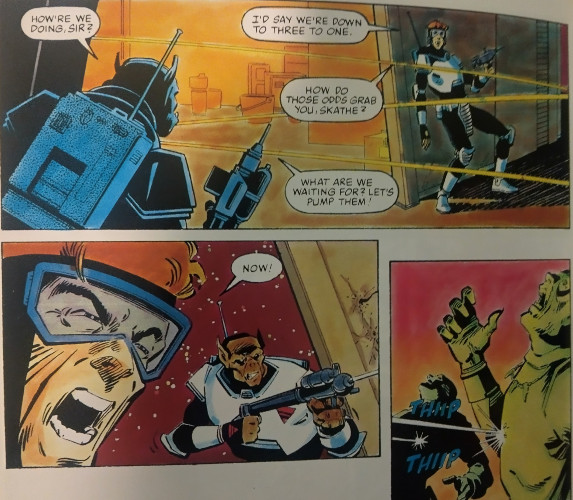
I mentioned, in reviewing Starlin's "Metamorphosis Odyssey," that the adults-oriented Epic format allowed the writer to grapple with content and concepts not necessarily suitable for younger audiences…or, at least, not from the perspective that kids would be encouraged to indulge. A sense of nihilism crept into Starlin's work, not unlike the kind seen in his Thanos, yet not in a way which framed such a belief as outright wrong. Zelenetz and Cirocco provide a similar experience, challenging readers by drawing crooked lines around policies and morals. Our heroes take risks, break rules, and make foolish decisions, some of which are fatal. They're not perfect, and their actions and mistakes have consequences. It's a multi-faceted reading experience, one which enables you to cheer on Nomad Squadron when they fight for a greater sense of justice while bowing your head in defeat just a little when human notions of nobility and honor are occasionally challenged, frustrated, or betrayed by self-preservation, disloyalty, and arbitrary policy.